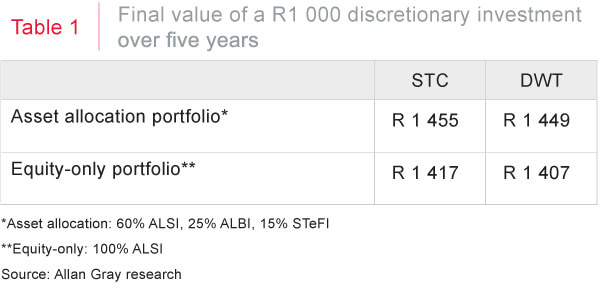The new Dividend Withholding Tax (DWT) replaced Secondary Tax on Companies (STC) on 1 April 2012. Investors are understandably concerned about the long-term impact of this tax and the real effect on their investments. Our research shows that although the change in the way dividends are taxed will impact your investment, the net effect of the latest change is relatively small. Any possible benefit or disadvantage should ultimately be weighed against your objectives, circumstances and risk profile, which should form the basis of your investment planning. As always, if you need help with your investment planning you may wish to speak to an independent financial adviser.
What are the key points?
Under STC companies were taxed on dividends distributed at a rate of 10%. With the recent changes, the liability for tax on dividends has shifted to the investor and the rate has increased to 15%. Because the new tax is deducted from the dividends received, rather than paid by the company on top of dividends, the effective increase in the rate is slightly higher than 5%. The effect of these changes on existing investments, or investment planning, depends on the underlying unit trusts as well as the investment product.
Only a portion of your investment is affected
All other things being equal, the impact of the change in tax will be to reduce dividend income by a total of 6.5%, which will clearly make a difference to those relying on dividend payments. But investment return is not just made up of dividends distributed by equities, it also includes capital growth and income from interest earned. As its name suggests, DWT only affects the dividend portion of your investment’s overall return. Therefore, the impact on your investment will differ depending on your asset allocation.
The effects of replacing STC with DWT are minimal in a well-diversified discretionary investment, but may be more marked for investors seeking to benefit from the potential for higher capital growth and associated higher dividend yields from equities. Table 1 compares illustrative five-year investments into an asset allocation portfolio and an equity-only portfolio, taxed at 10% STC and 15% DWT. We used five-year returns to 31 March 2012 of the FTSE/JSE All Share Index (including income and gross of all tax) (ALSI: 7.53%), the All Bond Index (ALBI: 8.75%) and the Short-term Fixed Interest Index (STeFI: 8.4%) to represent performance in our example. Over this period, dividends made up 3.29% of the ALSI’s total returns. In this scenario, the impact of the change in tax on the final values is very small, even over a five-year period.

Retirement fund investors benefit
If you are a retirement fund investor (i.e. you are invested in a retirement annuity, living annuity and/or preservation fund), you will benefit from the change from STC to DWT. This is because retirement fund investors do not pay any tax on returns and the shift to investor liability for tax on dividends effectively removes this tax for these investors. Even for a retirement fund or a member of a fund with the maximum amount in South African equities the saving will be, once again, fairly small – under the same assumptions above, we calculate a difference of less than 2% in final value.
DWT affects unit trusts’ reported historical performance
Unit trusts management companies often include reinvested dividends in the calculation of unit trust return. In the past, these dividends would have been paid from profits that were reduced by STC. Since the introduction of DWT shifts the tax liability to the investor, although reinvested dividends will still be included, the effect of the tax will not be shown. This means that reported unit trust returns, specifically for high dividend yield unit trusts, may be marginally higher than the after tax-return many investors experience. This is consistent with the impact of capital gains tax and income tax on interest earned in unit trusts.
Allan Gray Proprietary Limited is an authorised financial services provider. The FTSE/JSE Africa Index series is calculated by FTSE International Limited (‘FTSE’) in conjunction with the JSE Securities Exchange South Africa (‘JSE’) in accordance with standard criteria. The FTSE/JSE Africa Index Series is the proprietary information of FTSE and the JSE. All copyright subsisting in the FTSE/JSE Africa Index Series index values and constituent lists vests in FTSE and the JSE jointly. All their rights are reserved. Collective Investment Schemes in Securities (unit trusts) are generally medium- to long-term investments. The value of units may go down as well as up and past performance is not necessarily a guide to the future. Unit trust prices are calculated on a net asset value basis, which is the total market value of all assets in the portfolio including any income accruals and less any permissible deductions from the portfolio divided by the number of units in issue. Allan Gray Unit Trust Management (RF) Proprietary Limited is a member of the Association for Savings & Investment SA (ASISA).